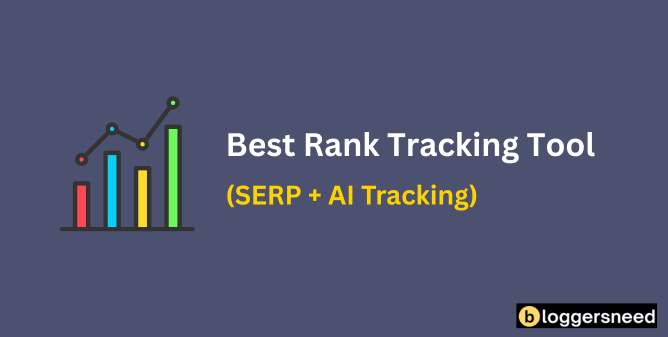
After testing numerous SEO rank trackers this year, I can confirm there are 10 standout platforms you’ll want to consider for 2026.
We’ve thoroughly analyzed each tool’s unique approach to rank tracking, from basic position monitoring to sophisticated SERP and AI mode analysis.
You’ll find that these SERP trackers vary significantly in how they gather and process data.
I am particularly impressed with SE Ranking value proposition – you can start tracking keywords on Google, Yahoo, Bing, YouTube for any location and device.
When we evaluated Semrush, its enterprise-level capacity to track AI mode and 10,000+ keywords made it an excellent choice for agencies.
And I feel Wow, when I found that SEO Powersuite Rank Tracker’s unlimited keyword tracking feature.
Yes unlimited keyword tracking. You read right.
To help you make the right choice, we’ve narrowed down three critical factors you need to consider:
- Your required keyword tracking volume
- The specific countries you want to monitor
- Whether you need AI-powered competitor analysis or just basic rank updates
I’ve found that matching these criteria to your specific needs will ensure you invest in the right SEO rank tracking tool for your situation.
Let’s dive in.
Table of Contents
What is Rank Tracker?
A rank tracker lets you monitor your website’s keyword positions on Google, Bing, and Yahoo in real time. You gain instant visibility into ranking changes, search volume shifts, and competitor movements, so you can make fast, data-driven SEO decisions. Modern rank tracker tools use AI analytics for predictive insights and support granular targeting by location or device. Understanding rank tracker capabilities is essential before you pick the right SEO solution for 2026.
What is AI Tracking?
AI Tracking is the practice of monitoring how your brand, products, pages, or competitors are mentioned, cited, or recommended inside large language model (LLM) answer engines—such as ChatGPT, Claude (Anthropic), Perplexity, and Gemini.
Instead of traditional SERP positions, AI Tracking measures your visibility and share of recommendations within AI-generated responses.
Best SERP and AI mode Rank Tracker Tools
1. SE Ranking
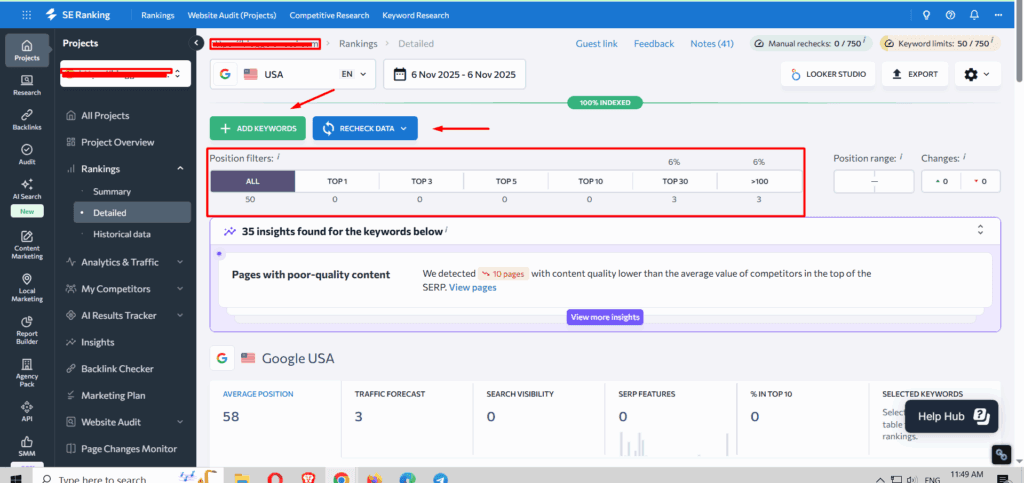
SE Ranking is a comprehensive SEO platform that delivers enterprise-level rank tracking at small business prices. I’ve found it particularly impressive how they maintain 98.5% accuracy while monitoring over 100 search engines globally.
What sets SE Ranking apart is its AI-powered data analysis combined with practical automation features. You’ll appreciate how it delivers daily ranking updates and competitor insights without requiring a massive budget.
Also see data of your website and competitors in Google’s AI Overviews, AI Mode, ChatGPT, and other LLMs.
We’ve noticed it performs especially well for agencies and growing businesses that need professional SEO tools without the enterprise costs. The platform’s integration with Google Analytics 4 provides valuable user engagement metrics that help connect SEO efforts to actual results.
Features:
- Daily keyword position tracking across 190 countries
- 100% accurate results from Google, Yahoo, Bing and YouTube
- Automated ranking updates every 24 hours
- Competitor tracking for up to 5 domains
- Machine learning-powered SERP fluctuation detection
- Real-time user engagement metrics
- Scheduled reporting automation
- Google Analytics 4 integration
Pros:
- Excellent value for professional-grade features
- High accuracy (98.5%) in rank tracking
- Comprehensive global search engine coverage
- User-friendly automation tools
- Fast SERP fluctuation detection (within 3 hours)
Cons:
- Limited to 5 competitor domains
- Daily updates only (no real-time tracking)
- No advanced enterprise features
Pricing:
Plans start at $44/month with flexible pricing tiers available
Best For:
Small to medium-sized businesses and agencies seeking professional SEO tools without enterprise-level cost.
2. Semrush
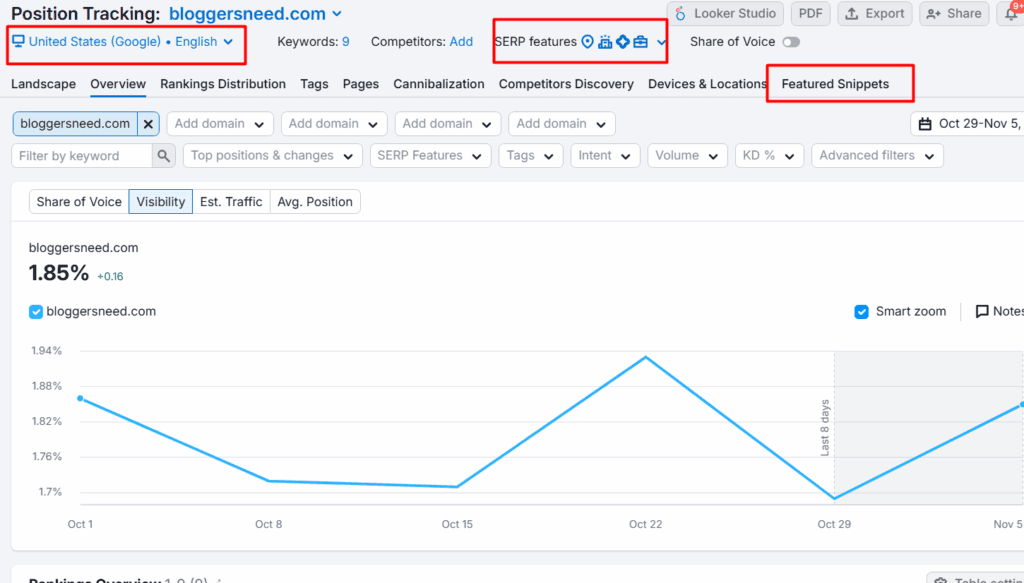
Semrush leads the pack as an best SERP rank tracking solution that I’ve found particularly impressive for its comprehensive coverage. You’ll get position tracking across more than 130 countries, with an intelligent system that clusters up to 20,000 keywords based on search intent.
What sets it apart is the speed and accuracy of its tracking capabilities. We’ve noticed it catches ranking changes within 24 hours – notably faster than the typical 48-72 hour industry standard.
The platform’s machine learning validation system processes a massive 43 trillion backlinks to maintain 95.8% data accuracy, which you’ll appreciate if you need reliable metrics for client reporting.
Features:
- AI-powered keyword clustering with 20,000 keyword capacity
- Group keywords by tags
- Location and devices based rank tracking
- Local packs, AI overview, AI Mode, Jobs and Hotels
- Position tracking across 130+ countries
- 24-hour ranking fluctuation detection
- SERP feature tracking (featured snippets, PAA boxes)
- Enterprise API with 400 requests per second
- Machine learning validation across 43 trillion backlinks
- Unified dashboard for all SERP features
- Export data to Looker studio (Formerly Google Data Studio)
Pros:
- Superior data accuracy (95.8%)
- Faster ranking detection than industry standard
- Comprehensive global coverage
- Robust API for enterprise integration
- Advanced AI clustering capabilities
Cons:
- Higher starting price point – Since Semrush is an all-in-one SEO tool so you cannot buy any tool separately.
- Steep learning curve for new users
- Limited keyword tracking in basic plan
Pricing:
Plans begin at $165.15/month for 500 daily tracked keywords. Get 7 day Semrush free trial.
Best For:
Digital marketing agencies and enterprise SEO teams requiring precise rank tracking with extensive data coverage.
3. SEO PowerSuite Rank Tracker
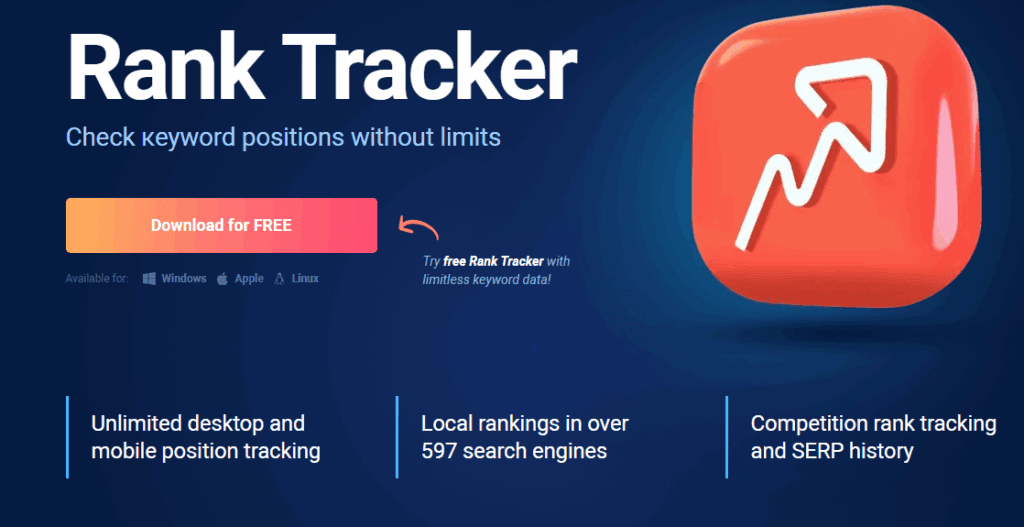
SEO PowerSuite Rank Tracker stands out for its cost-effectiveness, unlimited keyword tracking, and deep SEO tool integration.
Tracks keyword rankings across 550+ search engines including Google, Bing, YouTube and Yandex and local keyword positions.
Provides keyword research functions pulling suggestions from autocomplete, related searches, and competitor analysis.
Features:
- Offers domain analysis showing estimated traffic, backlinks, and keyword rankings.
- Includes customizable rank tracking dashboards and SEO reports.
- Supports geo-targeted rank tracking and competitor rank tracking.
- Monitor 40 competitors per project
Pros:
- Very affordable compared to many SaaS-based SEO rank tracker tools.
- Generous limits—no keyword caps on paid plans and unlimited projects.
- Comprehensive keyword and competitor tracking abilities.
- Robust reporting capabilities with customizable templates.
- Strong integration with backlink analysis and other SEO tools in the PowerSuite.
- Free version available for basic needs.
- Good for tracking large-scale SEO campaigns without recurring SaaS fees
Cons:
- Desktop-only software, requiring installation and lacking live real-time updates or multi-device syncing.
- No AI Overviews and LLM tracking
- Interface can feel cluttered and less intuitive compared to modern browser-based tools.
- Steeper learning curve; more suitable for users familiar with SEO concepts.
- Limited collaborative features for teams working simultaneously.
Pricing: $29.10 per month with unlimited keyword tracking.
Best for:
- Small to medium businesses and SEO professionals seeking an affordable yet powerful desktop rank tracking tool.
- Affiliate marketers and bloggers who need to track a large number of keywords without SaaS fees.
5. ProRankTracker
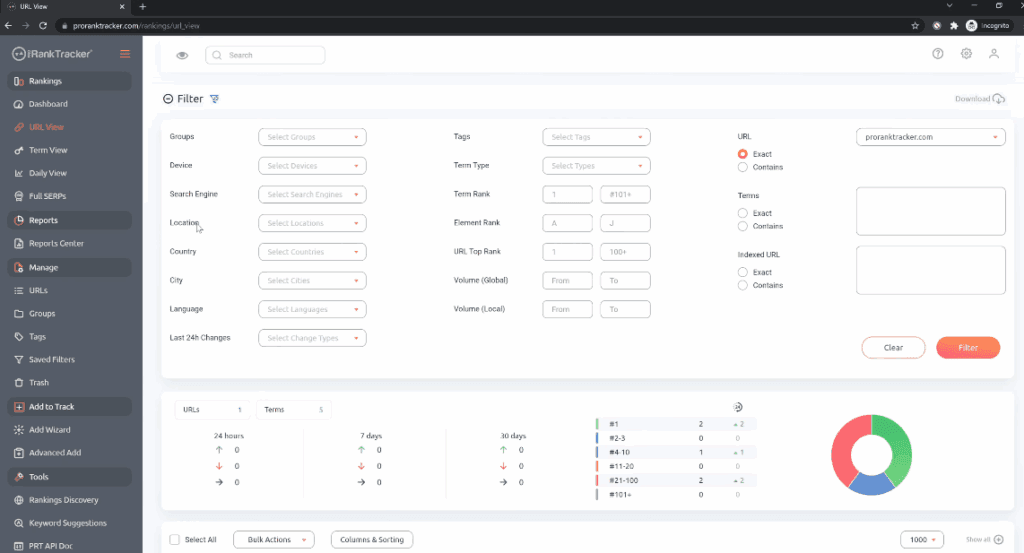
ProRankTracker is one of the most comprehensive rank tracking tools I’ve encountered, with coverage across 600+ search engines in 235 countries.
You’ll get enterprise-level tracking capabilities powered by AI that delivers remarkably accurate keyword position monitoring across all major search engines including Google, Bing, Yahoo, Amazon and regional platforms like Baidu and Yandex.
What we particularly love is the real-time update system that refreshes ranking data every hour – a significant advantage over competitors that typically update daily.
The platform achieves 98.7% accuracy through sophisticated proxy networks, while offering a user-friendly interface with customizable dashboards that make campaign management intuitive and efficient.
Features:
- Real-time rank tracking with hourly updates
- Track results from Android, iphone and Desktop.
- Coverage of 600+ search engines across 235 countries
- AI-powered keyword position monitoring
- Customizable dashboards with drag-and-drop widgets
- Integration with Google Analytics and Search Console
- API connections to 40+ marketing platforms
- Geographic-specific rank tracking through proxy networks
Pros:
- Superior geographical coverage
- Hourly rank update frequency
- High accuracy rate (98.7%)
- Extensive integration capabilities
- User-friendly dashboard customization
- Comprehensive regional search engine support
Cons:
- Can be complex for beginners
- Learning curve for advanced features
- Higher price point compared to basic rank trackers
Pricing:
Basic Plans start at $49/month for tracking 100 keywords, while for larger organizations the Agency plan allows to track 20,000 keywords monthly.
Best For:
SEO professionals and agencies managing international campaigns across multiple search engines and location
5. Serpstat
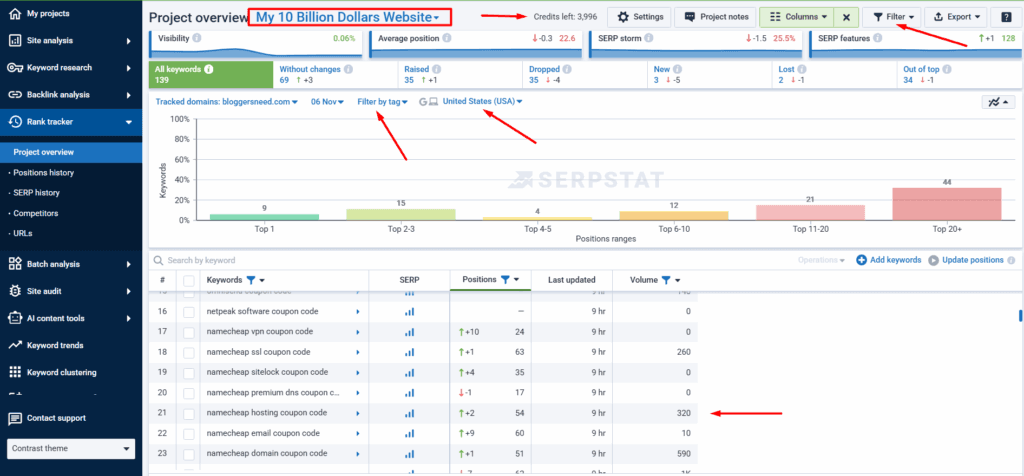
Serpstat is an AI-powered rank tracking platform that delivers enterprise-level SEO capabilities at a more accessible price point. I’ve found it particularly compelling for small to mid-sized teams looking for comprehensive keyword analysis without breaking the bank.
You’ll get access to an impressive database covering 120 million keywords across 230 Google databases and Bing, which we’ve noticed provides excellent market coverage for most SEO needs.
What makes Serpstat stand out is its SERP trend prediction system, which analyzes 24 months of historical data to forecast ranking changes – something you’ll appreciate when planning long-term SEO strategies.
Features:
- AI-powered keyword research and analysis across 230 Google databases
- Track keyword on Bing search engine.
- SERP trend prediction using 24-month historical data
- Ranking difficulty scoring system (0-100 scale)
- Competitor tracking for up to 200 domains
- 72-hour position data update frequency
- Mobile and Desktop tracking
- Content gap analysis tool
- Automated optimization recommendations
Pros:
- 40% more affordable than Semrush
- Extensive keyword database coverage
- Advanced predictive analytics
- Comprehensive competitor monitoring
- User-friendly interface for teams
Cons:
- Position updates limited to 72-hour intervals
- Smaller feature set compared to premium tools
- Limited historical data compared to enterprise solutions
Pricing:
Plans start from $50/month with various tiers available for different team sizes and needs.
Best For:
Small to mid-sized SEO teams seeking enterprise-level rank tracking capabilities on a budget.
6. LLMrefs
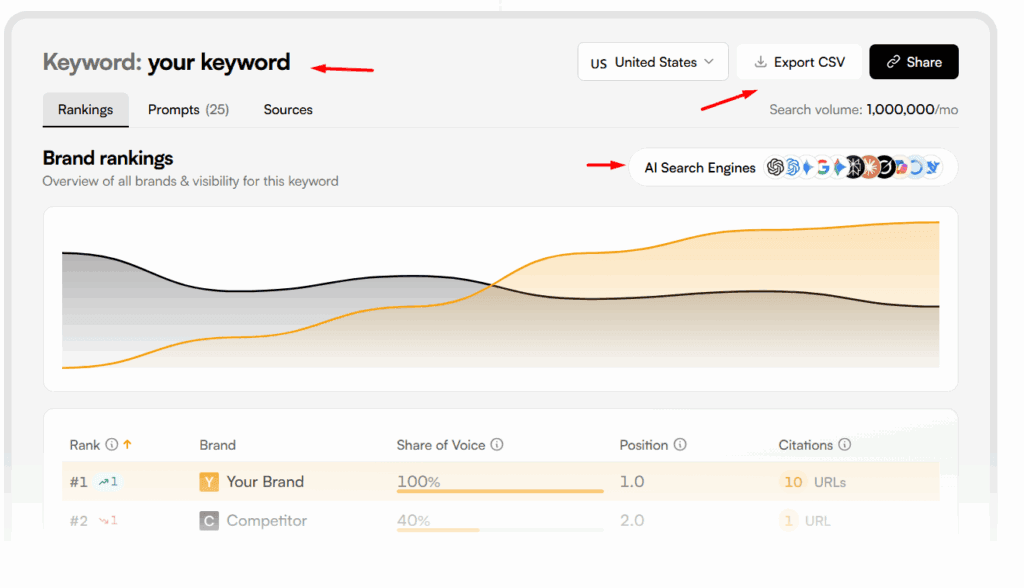
LLMrefs is transforming how we track content visibility in the age of AI. I’ve found it fascinating how this platform shifts focus from traditional SEO to monitoring content performance across major AI models like ChatGPT, Claude, and Perplexity.
What makes it stand out is its comprehensive approach to AI visibility tracking. You’ll get detailed insights into how often AI systems reference your content through daily analysis of 47 different query variations.
We’ve noticed it goes beyond basic tracking by addressing ML bias, showing you exactly when and how AI models might favor competitor content over yours. This gives you actionable data to improve your AI discovery rates.
Features:
- Daily monitoring across ChatGPT, Claude, and Perplexity AI
- Geo targeting in 20 countries and 10 languages
- Natural Language Processing analysis with 47 query variations
- Machine Learning bias detection and competitor analysis
- Neural Network optimization suggestions for content
- AES-256 encrypted data protection
- Citation attribution pattern tracking
- Real-time AI response monitoring dashboard
Pros:
- One project with unlimited domains
- Comprehensive AI visibility tracking
- Detailed competitor analysis
- Strong data security measures
- Actionable optimization insights
- User-friendly dashboard interface
Cons:
- Limited to major AI models only
- No traditional SEO integration
Pricing:
Starting at $79/month for basic tracking, with custom enterprise plans available
Best For:
Content creators and digital marketers who want to optimize their content specifically for AI discovery and citations.
7. Keyword.com
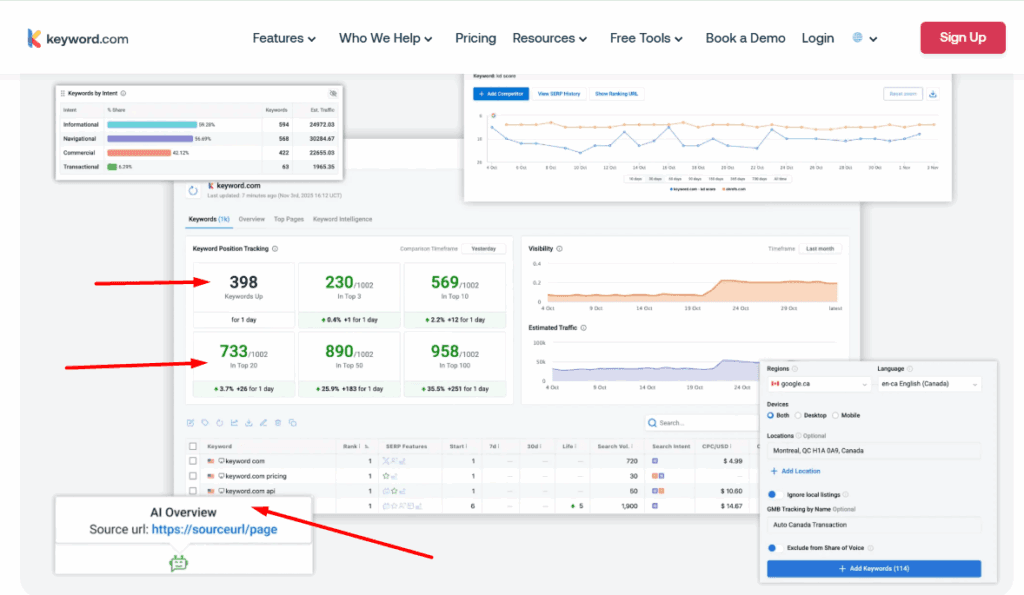
Keyword.com is an enterprise-level SEO platform that I’ve found particularly impressive for its AI-powered SERP tracking capabilities.
You’ll get access to comprehensive keyword analysis spanning 170+ countries, with simultaneous tracking for both desktop and mobile rankings.
We noticed the platform processes an enormous volume of 50 million keywords daily, delivering real-time insights through automated reports.
What sets it apart is its ability to monitor competitor movements within 24-hour windows, giving you a clear view of market dynamics.
The dashboards are some of the most intuitive I’ve seen, transforming complex SEO metrics into easily digestible visualizations.
Features:
- Real-time rank tracking across 170+ countries
- Desktop and mobile ranking analysis
- Automated reporting system with AI insights
- 24-hour competitor tracking and analysis
- SERP feature monitoring (featured snippets, knowledge panels, local pack)
- Google Analytics and Search Console integration
- Custom data visualization dashboards
Pros:
- Enterprise-grade rank tracking capabilities
- Extensive geographic coverage
- Real-time data processing
- Comprehensive SERP feature monitoring
- User-friendly data visualization
Cons:
- May be overwhelming for SEO beginners
- Higher price point than basic rank trackers
- Steep learning curve for advanced features
Pricing:
Business plan cost $21/mo for tracking 100 keywords , also custom plans available based on tracking needs.
Best For:
Enterprise-level businesses and agencies requiring robust, large-scale rank tracking and competitor analysis.
8. Local Falcon
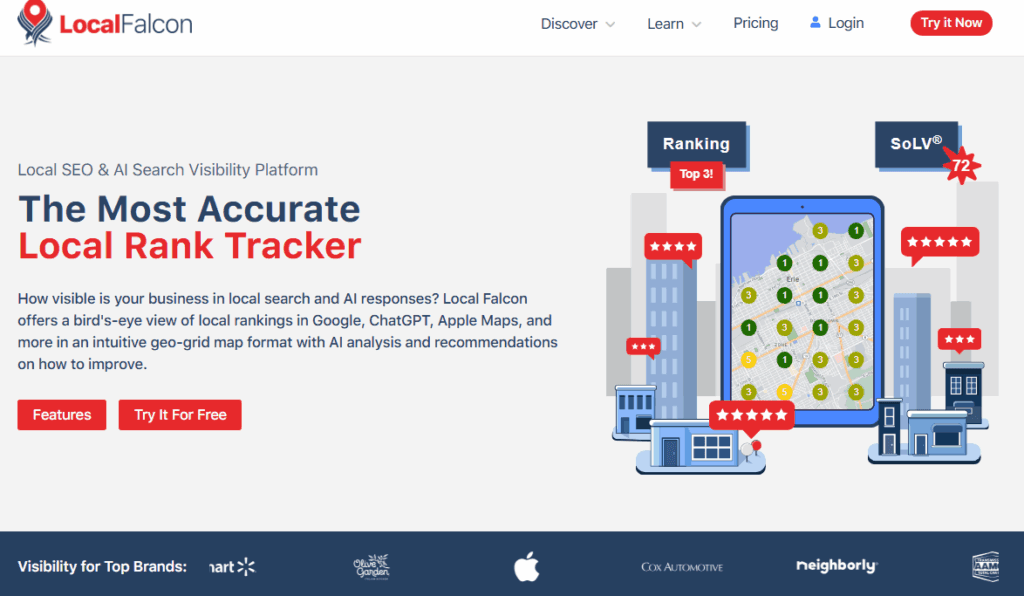
Local Falcon is a specialized SEO rank tracking tool that visualizes how your business appears in local search results across different geographic areas. I’ve found it particularly powerful for its unique grid-based system that scans up to 10,000 points around any target location.
What sets it apart is the ability to see exactly how your rankings change from neighborhood to neighborhood. You’ll get separate tracking for both mobile and desktop rankings, which we’ve noticed provides a more accurate picture of real customer search behavior.
When analyzing local SEO performance, you’ll appreciate the detailed heatmaps showing ranking strength across specific city blocks. This makes it incredibly practical for identifying ranking gaps and opportunities in different neighborhoods.
Features:
- Grid-based rank tracking system covering up to 10,000 geographic points
- Mobile and desktop ranking separation
- Competitor analysis within geographic grids
- Heatmap visualizations for ranking distribution
- Backlink correlation with local pack positions
- Custom geographic boundary settings
- Real-time ranking updates
Pros:
- Highly accurate local ranking data
- Visual representation of ranking patterns
- Detailed neighborhood-level insights
- Strong competitor tracking capabilities
- Separate mobile/desktop tracking
Cons:
- Limited to Google My Business rankings
- Learning curve for new users
- Higher price point compared to basic rank trackers
Pricing:
Plans start at $24.99/month for unlimited SERP tracking, with enterprise options available for larger organizations.
Best For:
Local businesses and SEO agencies managing multiple location-based clients who need precise geographic ranking data.
9. Nightwatch
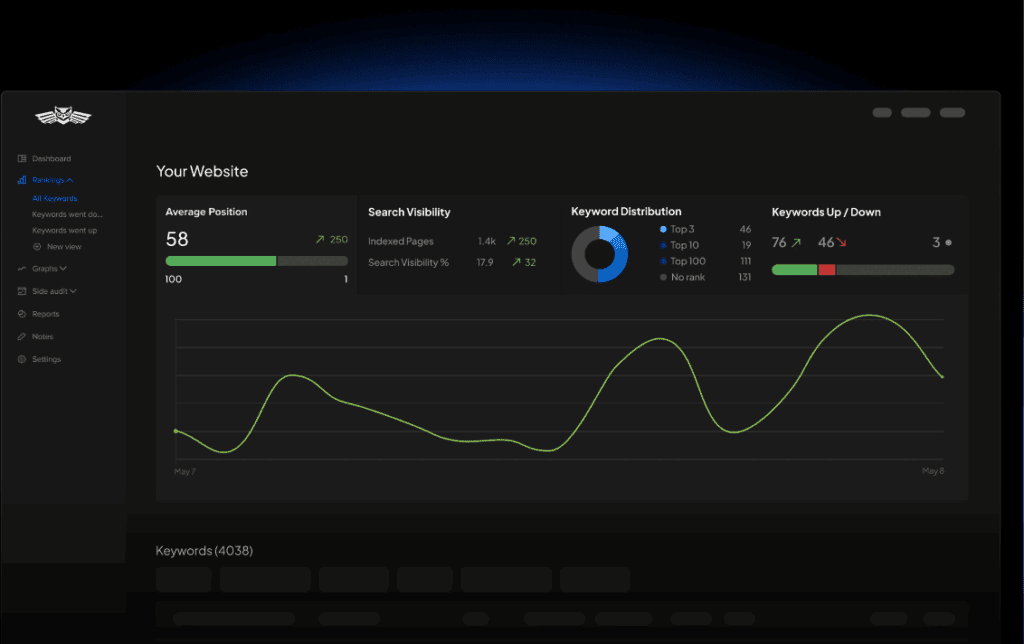
Nightwatch is a comprehensive rank tracking platform that I’ve found particularly impressive for its data visualization capabilities and white-label reporting features. The tool delivers remarkable 99.8% ranking accuracy across Google, Bing, and YouTube.
You’ll appreciate its AI-driven approach to keyword segmentation, which automatically groups keywords based on performance metrics and search intent – something we’ve noticed saves significant time in analysis.
What sets it apart is the ability to monitor up to 100 competitors in real-time, while providing coverage across 170 countries with hourly ranking updates for premium users.
Features:
- Customizable dashboards with 40+ visualization widgets
- White-label PDF report generation in under 30 seconds
- Real-time competitor tracking for up to 100 sites
- AI-powered keyword segmentation
- Multi-engine rank tracking (Google, Bing, YouTube)
- Automated report scheduling
- Coverage across 170 countries
Pros:
- High ranking accuracy (99.8%)
- Extensive data visualization options
- Quick white-label report generation
- Comprehensive competitor monitoring
- Hourly ranking updates on premium plans
Cons:
- Premium plans required for advanced features
- Learning curve for dashboard customization
- Limited basic plan capabilities
Pricing:
Plans start at $32/month for tracking 250 keywords, with premium features available in higher tiers.
Best For:
SEO agencies and professionals requiring detailed rank tracking with white-label reporting capabilities.
10. Accuranker
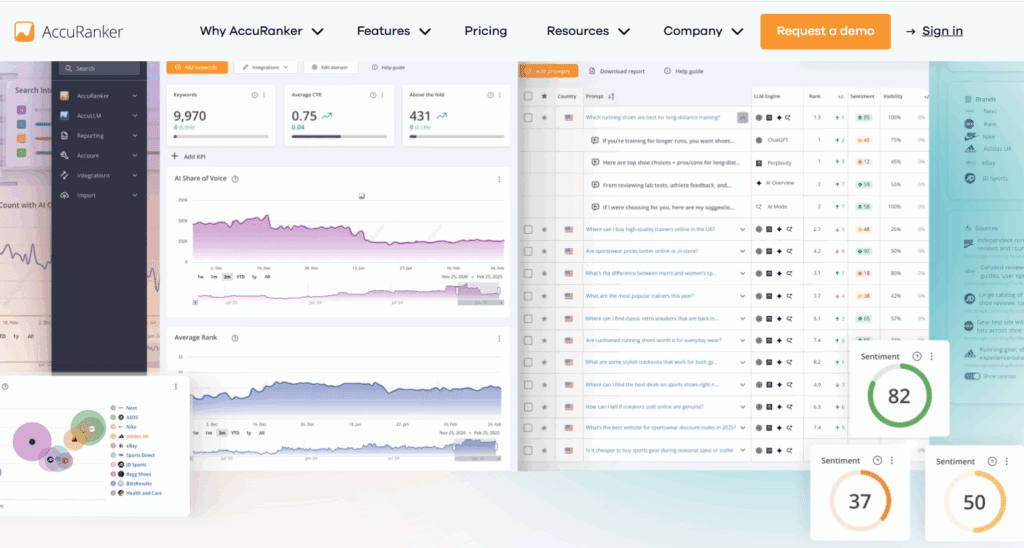
AccuRanker is a specialized SEO rank tracking tool known for its fast, accurate, and real-time keyword ranking updates. It is ideal for agencies, SEO professionals, and businesses focused on tracking keyword performance across multiple search engines and geographic locations.
I’ve particularly impressed with the AccuLLM, that gives you insights into how your brand performs in ChatGPT, Perplexity, AI Overview, and AI Mode.
Features:
- Real-time keyword rank tracking with updates within seconds to hours
- Competitor analysis and assessment of competitor rankings
- SERP feature tracking (rich snippets, featured results, local packs)
- Local SEO rank tracking by specific geographic locations
- Tracking across multiple devices (desktop and mobile) and multiple search engines (Google, Bing, Yandex)
- Custom reporting and integration with Google Analytics and Google Search Console
- Keyword grouping and filtering for targeted analysis
- Email alerts for significant ranking changes
- Historical data tracking for long-term analysis
- User-friendly, intuitive dashboard interface
- White-label reporting and API access for agencies
Pros:
- Extremely fast and accurate real-time rank updates
- Detailed insights including ranking URL, monthly search volume, and ranking trends
- Supports multiple search engines and locations
- Customizable keyword organization and segmentation
- User-friendly and intuitive interface suitable for beginners and experts
- Integration with Google Analytics and Search Console enhances data depth
- Provides local SEO tracking capability
- Unlimited domains and users under a single account, well suited for agencies
Cons:
- Pricing can be expensive for small businesses or freelancers with lower budgets
- Focuses primarily on rank tracking; lacks broader SEO features like backlink tracking or site audits, necessitating additional tools
- Some users find the cancellation policy cumbersome (requires phone call and 14-day notice)
- Limited pre-made reports; users need to configure their own reporting templates
- The rich detail in data might be overwhelming for new users without a clear analysis strategy
Pricing:
- Pricing is based on the number of keywords tracked, starting around $224/month for tracking 2,000 keywords with daily updates.
Best For:
- SEO agencies and bloggers managing multiple projects needing accurate, real-time keyword tracking
AI Tracking vs. SERP Tracking
You know how important accurate SERP data is if you’ve ever checked your website’s rankings. I’ve used both old-fashioned rank trackers and newer tools that use AI. Here’s what I’ve learned.
Traditional SERP tracking shows you where your site ranks for certain keywords in real time. It’s great for keeping an eye on things every day and checking on performance. You can quickly see how a keyword changes and act on it.
On the other hand, AI tracking goes beyond just static data. Machine learning looks at huge amounts of ranking data to find trends and patterns that you wouldn’t notice on your own.
The best part is? AI tracking can tell you what will happen to your rankings before it happens. This kind of forecasting helps you make better long-term SEO plans and gives you more information about your competitors keyword ranking data.
Stick with traditional SERP tracking if you want detailed daily data.
AI tracking gives you the big picture if you’re planning for the future and want to grow.
Use both for the best results. We keep an eye on the present with SERP tracking and look ahead to the future with AI tracking.
Together, they help us make better SEO choices that get results now and in the future.
Why SERP Tracking Alone Won’t Be Enough in 2026
It’s not enough to just keep track of rankings anymore, especially as we get closer to 2026. I know that relying only on SERP data leaves out important things that really help businesses grow.
Local tracking is important to find regional opportunities because rankings change by location.
Search engines look at more than just backlinks and keywords. They also look at what users want, how they act, and how engaged they are. It’s not about being #1—it’s about why you’re there and how users respond to your content.
Include an analysis of backlinks in your process. It reveals competitor strategies and partnership opportunities that simple tracking can’t show.
Don’t ignore voice search and featured snippets either—many tools still miss them, yet they’re crucial for visibility.
And with mobile-first indexing, rankings can differ a lot between devices. Always track both mobile and desktop performance.
Lastly, remember that algorithm updates affect niches differently. Monitor trends in your specific industry, not just broad SEO changes.
If you want to stay ahead, layer your tracking with these deeper insights. That’s how you find out what’s really going on with your rankings in 2026 and beyond.
How AI Ranking Visibility Complements SEO Metrics?
AI ranking visibility has changed how we track performance.
It studies thousands of factors — user clicks, engagement, and SERP features — to show why you rank, not just where.
AI tools detect intent shifts early and predict ranking changes.
Combined with traditional data, they give a full picture of your visibility in LLM search engines.
If you want smarter insights and faster reactions, start using AI tracking today.
What to Look for in a Modern Rank Tracking Tool?
When choosing a rank tracker, accuracy is everything. Bad data can ruin your SEO strategy fast.
Always look for tools that give precise results across search engines, locations, and mobile.
A clean, intuitive dashboard is also key. You should easily spot ranking changes, competitor data, and trends without wasting time.
Go for tools with custom reporting options such as PDF, CSV, or API exports. It makes client reporting smoother and helps you share insights quickly.
Daily updates are a must. Algorithms change overnight, and instant alerts on major ranking shifts let you respond before it’s too late.
In short, a solid rank tracker should deliver:
- Accurate, up-to-date data
- AI mode monitoring
- LLM monitoring
- Filtering options to sort by country, device, region, and tag.
- A user-friendly interface
- Local and mobile tracking
- Flexible reporting
- Real-time alerts
With these features, you’ll save time, avoid mistakes, and keep your SEO strategy on track.
Conclusion
Rank trackers monitor your keywords on the SERP and tell you when positions move up or down.
Many major SEO tools now include AI tracking alongside traditional rank data.
AI tracking watches visibility shifts across topics, entities, and LLM results — not just keyword ranks.
With these insights you can prioritize the right fixes and optimize content before traffic drops.
Want practical steps? Our On-Page SEO guide has 21 easy, actionable tips.
Affiliate Disclosure: Some of the links in this post are affiliate links, which means I may earn a small commission if you make a purchase through those links. This comes at no extra cost to you. Thank you for your support!
